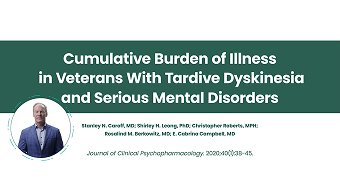Dr Mattingly: Tammy, we’ve talked about embarrassment and social isolation, but in what other ways can tardive dyskinesia impact function? What would you tell our clinicians out there?
Ms LeBlanc-Russo: I have one patient with very severe tardive dyskinesia who really struggles with activities of daily living. It’s important to ask patients, “Are you having any trouble walking, or do you feel like there’s any kind of odd movement in your hands or in your mouth? Are you having any trouble swallowing?”1
Dr Mattingly: So we’ve talked about the social impact, and some of the functional aspects. How else might tardive dyskinesia impact mental well-being?
Ms LeBlanc-Russo: Tardive dyskinesia can affect self-esteem, confidence, and self-worth.2 Could that lead to another mood episode? There’s always that question of, “What came first: the chicken or the egg?” So somebody is experiencing a mood episode, now their self-esteem can become impacted by tardive dyskinesia, which can cause them to isolate. What does that do to their mood? I feel like it’s a snowball effect, really.
Dr Mattingly: Tammy, one of my patients with tardive dyskinesia is a mom with bipolar disorder. She talked about the emotional impact of living with bipolar disorder, and then said, “And look at me now. I have to live with this as well.”
For a patient like this, I like to say we have treatments that potentially lessen the abnormal movements. I think that ray of hope really helps.
I’d say tardive dyskinesia doesn’t live in isolation. It can live in combination with emotional, social, and functional complications.2
Thanks for tuning in. There are more resources on tardive dyskinesia to explore, which have been created with your busy schedule in mind.

